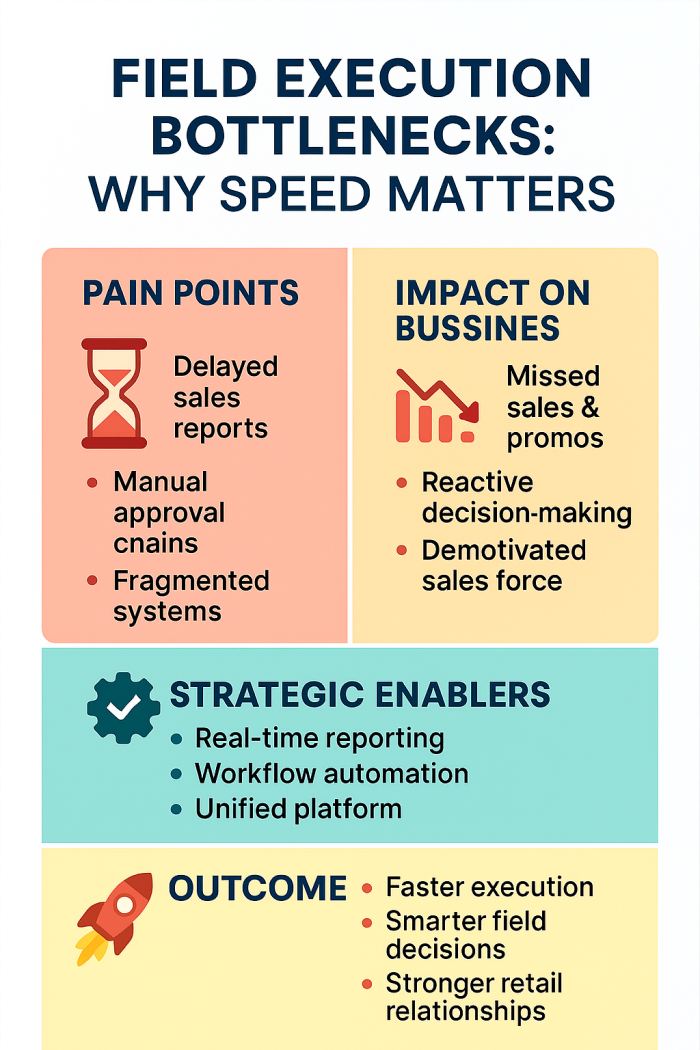Delays That Start at the Top, and Echo in the Field
In distribution-driven industries like FMCG, Pharmacy, and Tobacco, speed and accuracy in field execution are critical. Yet many organizations still struggle with delayed sales reporting and manual approval chains that paralyze decision-making on the ground. Field sales reps (salesman) complete their visits, submit orders, and request claim approvals—only to wait hours, sometimes days, for responses due to bottlenecks in reporting flows and outdated processes.
These delays are not minor operational hiccups. They lead to missed sales opportunities, disjointed promotions, stock misalignments, and, more importantly, a frustrated field force. The field team becomes reactive, unable to capitalize on real-time market conditions, while their competitors move faster and smarter.
Manual Chains Slow Down Modern Commerce
A major contributor to this slowdown is the persistence of manual or semi-manual approval chains embedded in many companies' operational culture. Trade promotions often require several levels of managerial approval—many still handled through spreadsheets, emails, or even paper-based signoffs. Claim settlements, credit limit approvals, and price overrides often go through loops of redundant checks with little automation.
This hierarchical friction results in a sluggish system that stifles agility. The field teams know what actions to take, but without prompt feedback loops, they operate in a vacuum. Execution becomes misaligned with strategy, and the cost is often borne in lost shelf presence, delayed order closures, or promotional misfires.
Reporting Delays Undermine Performance Monitoring
Slow sales reporting also means that business leaders are driving blind. Instead of getting real-time insights into which SKUs are moving, which regions are underperforming, or how effectively a campaign is being executed, they must rely on consolidated reports that arrive too late to act upon. Often, sales data is reviewed weekly or monthly—by which time any operational issue has snowballed.
This lag makes sales leadership reactive instead of proactive. Strategic decisions become disconnected from actual field activity. Moreover, campaign evaluations lose accuracy when based on fragmented or delayed data, making future planning less effective and highly dependent on assumptions.
Morale Drops When Action Stalls
For sales reps (salesman) and field teams, these delays are not just frustrating—they’re demotivating. Imagine walking into a store, negotiating with a buyer, but being unable to confirm a promo price or finalize a claim because you’re still waiting for back-office approval. Not only does this reduce rep confidence, it also erodes the retailer’s trust and cooperation.
A slow approval environment signals to the field that they’re not empowered, not trusted, and not prioritized. Over time, high performers become disengaged, innovation is stifled, and frontline talent is lost to more agile competitors.
Multiple Systems, No Single Source of Truth
Another issue lies in fragmented digital infrastructure. In many organizations, different systems are used for sales recording, promotion management, and claim approvals—with no unified interface or workflow. This causes duplication, miscommunication, and inconsistent records. When sales data is captured in one place and approvals handled in another, delays become inevitable.
This system fragmentation not only slows execution but also complicates troubleshooting. When issues arise—like missed claims or delayed discounts—no one knows where the breakdown occurred, making root cause analysis nearly impossible.
Speed is a Strategic Advantage, Not a Luxury
In today’s market, speed isn’t just operational—it’s strategic. Companies that enable their field teams to act quickly and autonomously are more likely to convert opportunities, adjust to local trends, and build stronger retail relationships. But speed requires real-time reporting and report automation—not just fast people.
The companies that are winning today are the ones that are removing layers, not adding them. They're giving the field visibility into stock, pricing, and customer history, while automating backend processes to support faster, smarter decisions.

Bridging the Gap with Workflow Modernization
Solving this challenge doesn't start with more staff or more rules. It begins with workflow redesign—streamlining the approval chain, embedding business logic, and integrating sales reporting into a unified platform. Approvals should be rule-based and automated wherever possible, with escalations only when exceptions occur. Sales reporting should be live, mobile-friendly, and connected across systems.
This requires executive commitment, operational alignment, and the right digital tools—but the payoff is immediate: faster field execution, better data visibility, and empowered sales teams.
Conclusion: Execution Can’t Wait for Admin
Speed to action determines success in distribution. If your sales reports take days to consolidate, and if every discount needs three emails to approve, you are already behind. The solution isn’t just automation—it’s operational intelligence. And that begins with the decision to prioritize speed, standardize workflows, and trust your field to deliver.
Your frontlines are ready. The question is—are your systems?
